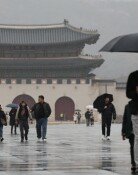[Editorial] Economic Reversion
The alarm sound from international business circles is growing bigger that the growth momentum of the Korean economy might lose its recovery power if it continues to weaken this way. If Korea fails to fuel its growth engine in four to five years, it might end up becoming a periphery of China or a country as poor as the Philippines, analyzed Andy Xie, chief economist of Morgan Stanley. This makes us ponder how Korea, once looked upon by the world, has been reduced to this status.
Argentina used to be the worlds seventh richest country until the 1930s, but it kept falling after being stuck in the trap of populism and now has only about $3,000 in income per capita. Even worse, its extreme gap between the rich and the poor has led to 55 percent of its population being in absolute poverty. Excessive foreign debts, unemployment, widespread strikes and demonstrations are preventing the economy from recovering.
The Philippines, which was dubbed the second Japan until the 1960s, has now become the worlds largest exporter of housemaids as corruption and dictatorship have stopped it from growing. The countrys per-capita income in 2002 stood at only $912, a figure that is not that greater than what it had about 20 years ago$671 in 1980. North Korea had similar national income to South Koreas back in the 1970s, but it has now ended up starving millions of its people. In this way, a country goes backward to a surprising extent just in a short period of time if it fails to put peoples motivations together through politics, the system, the institution and values.
Then where is Korea now? The concerns are coming true everywhere that the system and values of liberal democracy and market economy are deteriorating. Rather than focusing on enhancing the nations growth potentials, the ruling power is not only preoccupied with blaming others, revealing others past and taking sides, but also sticking to egalitarian ideology and pie-sharing welfare. The result: for the last four years since the inception of the Participatory Government, the Korean economy has grown below the potential growth rate. Nevertheless, the ruling power has turned a blind eye to problems with the growth engine.
Korea has enjoyed a rapid economic growth since industrialization, but it might now suffer a rapid fall if it continues to lose its growth momentum. The alarming sound might be a signal that it is already late.







